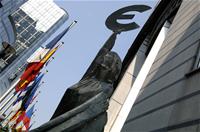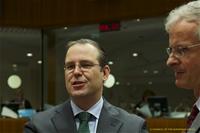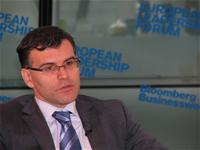Is it time to panic?
Ralitsa Kovacheva, November 30, 2010
 Hopes that the news about the Irish loan from the European rescue fund and the 4-year plan for fiscal consolidation, announced by Dublin, will calm the markets have proved false. Borrowing costs of Ireland, Portugal and Spain hit a new record, the Financial Times wrote. According to the newspaper, the bond yields of the three countries are currently at their highest since the creation of the euro. Analysts warn that the crisis may soon reach France and the Netherlands.
Hopes that the news about the Irish loan from the European rescue fund and the 4-year plan for fiscal consolidation, announced by Dublin, will calm the markets have proved false. Borrowing costs of Ireland, Portugal and Spain hit a new record, the Financial Times wrote. According to the newspaper, the bond yields of the three countries are currently at their highest since the creation of the euro. Analysts warn that the crisis may soon reach France and the Netherlands.
According to the Financial Times Deutschland Portugal is under pressure from other euro area countries and the ECB to follow the example of Ireland and to request financial assistance from the European rescue fund. The reason is concerns that any problems in Portugal could deteriorate the situation in Spain, which would be a real catastrophe. According to a German government source, quoted by the newspaper, "if Portugal were to use the fund, it would be good for Spain, because the country is heavily exposed to Portugal.”
Meanwhile, the German central banker and a European Central Bank council member Axel Weber commented that the rescue fund may need to be increased by additional 140 billion euro, in the worst case scenario. According media reports, “the German government had been approached by the European Commission to double the size of the rescue fund, to ensure funds were available in the event of Spain and Portugal seeking assistance.”
Is the panic of the markets reasonable and who will benefit from it? Many have accused German Chancellor Angela Merkel that her insistence on private sector's involvement in a future permanent crisis mechanism had unlocked market's hysteria. According to others, the current panic is pouring water into Germany’s mill because it proves the need for the establishment of a permanent crisis mechanism, as well as the need for a shared responsibility of private lenders who profit from such situations.
Speaking in the Bundestag on Wednesday Merkel fiercely defended the need of a mechanism through which the private sector to share the responsibility equally with taxpayers. “Have politicians got the courage to make those who earn money share in the risk as well? Or is dealing in government debt the only business in the world economy that involves no risk? This is about the primacy of politics, this is about the limits of the markets”, Merkel said. At the same time, she once again explained that whatever participation of private creditors in the mechanism would be decided, it would apply to after mid-2013 and not to any situation at the moment.
On Thursday Mrs Merkel held a telephone conversation with French President  Nicolas Sarkozy. Both leaders believe that the negotiations on the agreement with Ireland should be completed quickly. Paris and Berlin will issue a joint proposal on the future permanent crises resolution mechanism. This will be the main topic of the European Council on 16 December.
Nicolas Sarkozy. Both leaders believe that the negotiations on the agreement with Ireland should be completed quickly. Paris and Berlin will issue a joint proposal on the future permanent crises resolution mechanism. This will be the main topic of the European Council on 16 December.
Media reported that, according to a document of the German government private creditors should face "haircuts" or other debt payment restructuring measures. Banks and financial investors should be included in a collective action clause applied to all newly issued euro area government bonds. Such options were mentioned also in the Seoul statement of the finance ministers of the 5 largest EU economies.
 Meanwhile, Swedish Finance Minister Anders Borg has proposed all EU countries to participate solidarily in the future mechanism, but on a proportionate basis. The main criticism of Borg to the existing EU crisis lending facilities is that these "are financed in a way that neither reflects risk nor provides incentives for sound fiscal policies.”
Meanwhile, Swedish Finance Minister Anders Borg has proposed all EU countries to participate solidarily in the future mechanism, but on a proportionate basis. The main criticism of Borg to the existing EU crisis lending facilities is that these "are financed in a way that neither reflects risk nor provides incentives for sound fiscal policies.”
Therefore, according to Borg, the contributions in the future permanent mechanism must be according to the risk degree. “Otherwise a disproportionate burden is carried by countries with high credibility, which are unlikely to use the mechanism for their own financing needs.”
According to Borg, the mechanism could consist of the guarantees of member states in proportion to their GDP, on the one hand and on the other - of contributions based on the level of indebtedness. Countries with debt below 30 per cent of GDP will not pay any contributions, while those with more than 60 percent of GDP will pay the highest ones. So the countries will be encouraged to maintain low debt levels and thus lower contributions.
Following this logic, the countries that will not pay any contributions are Bulgaria,  Estonia and Luxembourg. These are the EU countries with zero risk and according to the proposal they should not pay, said Bulgarian Finance Minister Simeon Djankov after talks with Borg on the topic. During a meeting with his counterpart George Osborne in London Djankov has commented that "the EU countries with sound fiscal policies that are outside the euro area should be involved more actively in the drafting of the permanent mechanism for prevention and control of any future crises”.
Estonia and Luxembourg. These are the EU countries with zero risk and according to the proposal they should not pay, said Bulgarian Finance Minister Simeon Djankov after talks with Borg on the topic. During a meeting with his counterpart George Osborne in London Djankov has commented that "the EU countries with sound fiscal policies that are outside the euro area should be involved more actively in the drafting of the permanent mechanism for prevention and control of any future crises”.
The inclusion of all EU countries in the mechanism is logical because, although formally not in the eurozone, their economies are linked and every crisis in the euro area affects all. It remains to be seen what kind of proposal on the future mechanism the European Commission will present to the European Council on December 16. And of course, the Franco-German vision, which will probably be the basis for any upcoming decisions of the EU leaders.
By then, the panic will continue to rule over the markets and to hold policy decisions a hostage.
 Klaus Regling | © Council of the EU
Klaus Regling | © Council of the EU Mario Centeno | © Council of the EU
Mario Centeno | © Council of the EU Mario Centeno | © Council of the EU
Mario Centeno | © Council of the EU Angela Merkel, Emmanuel Macron | © Council of the EU
Angela Merkel, Emmanuel Macron | © Council of the EU Benoit Coeure | © Council of the EU
Benoit Coeure | © Council of the EU Pierre Moscovici | © Council of the EU
Pierre Moscovici | © Council of the EU